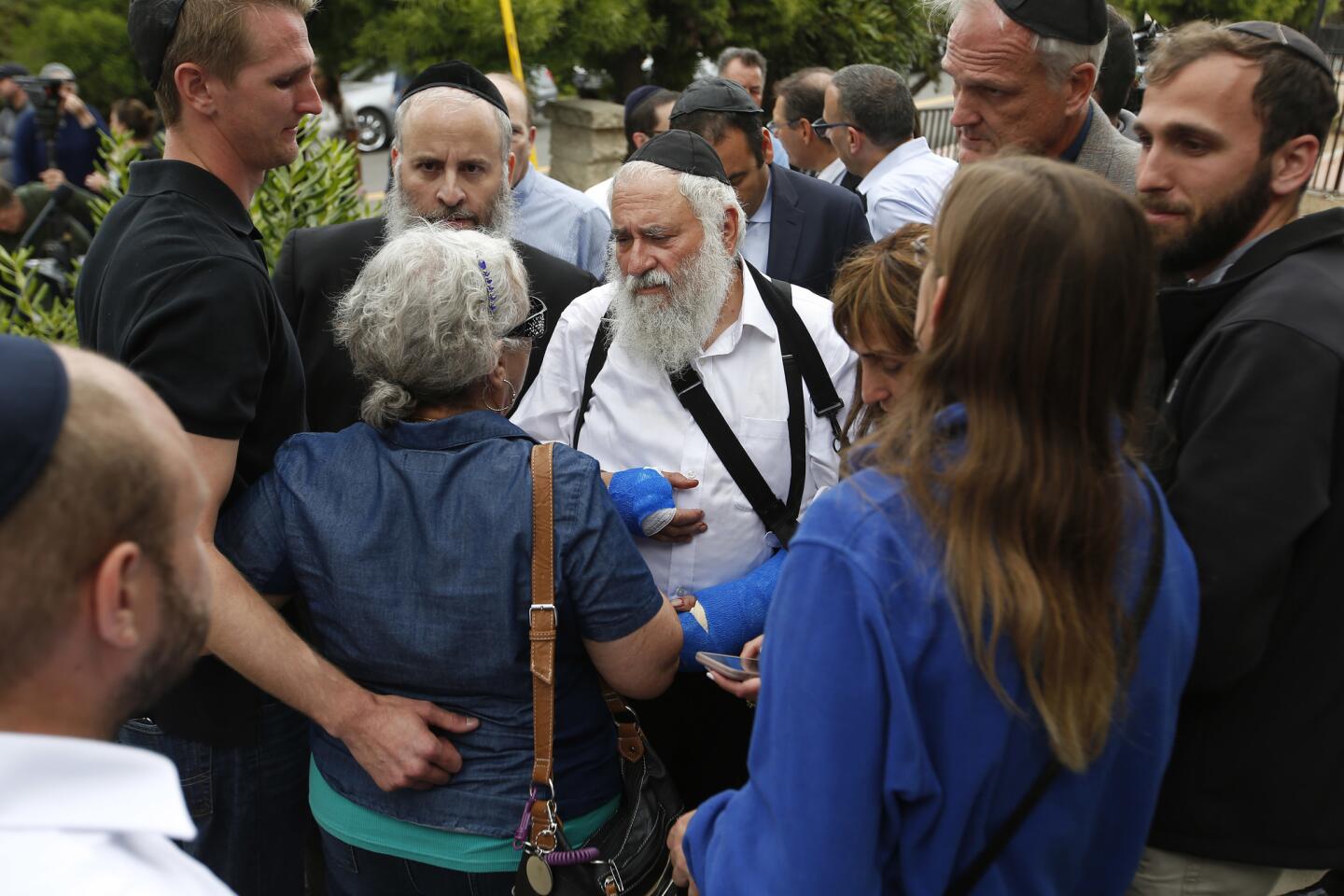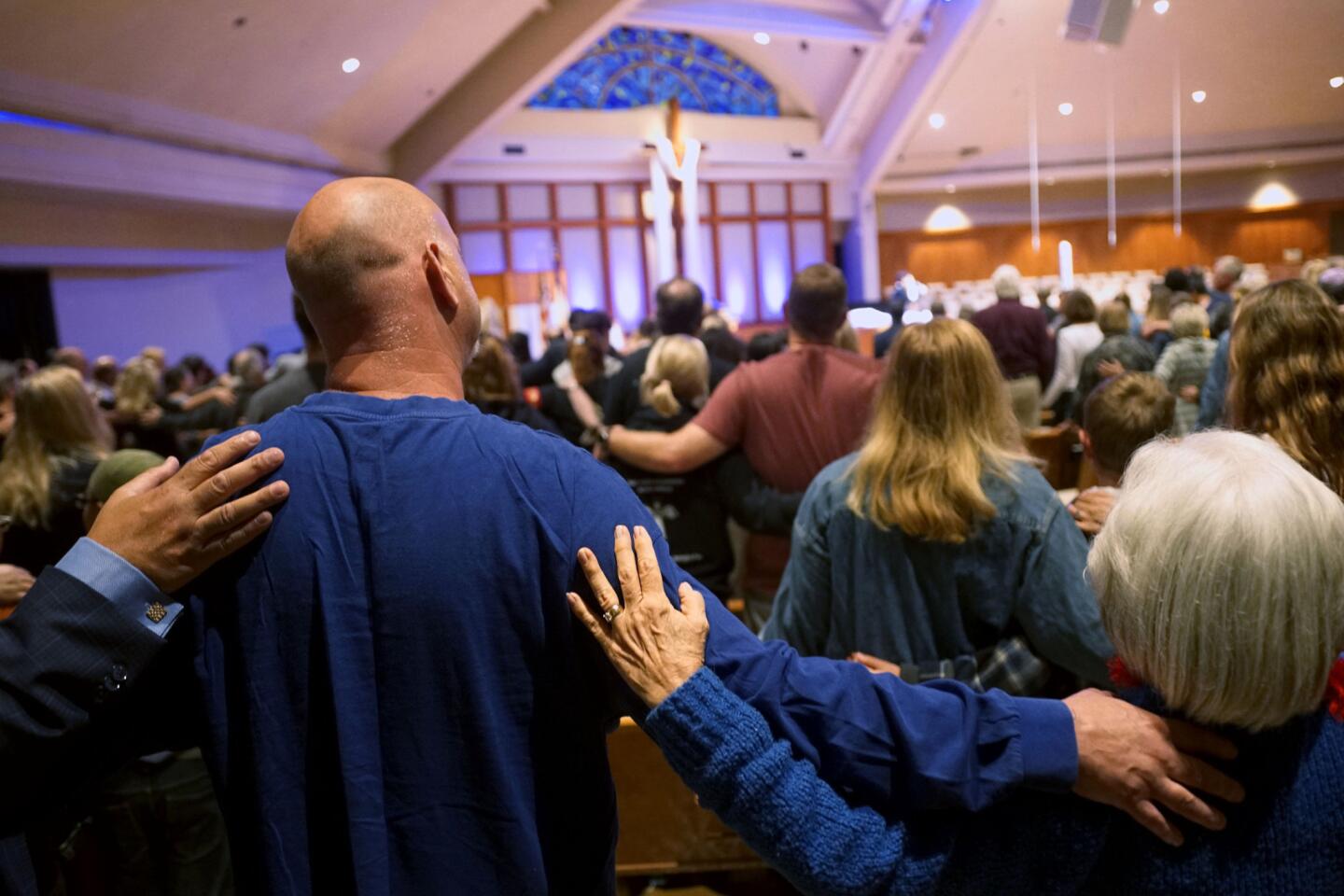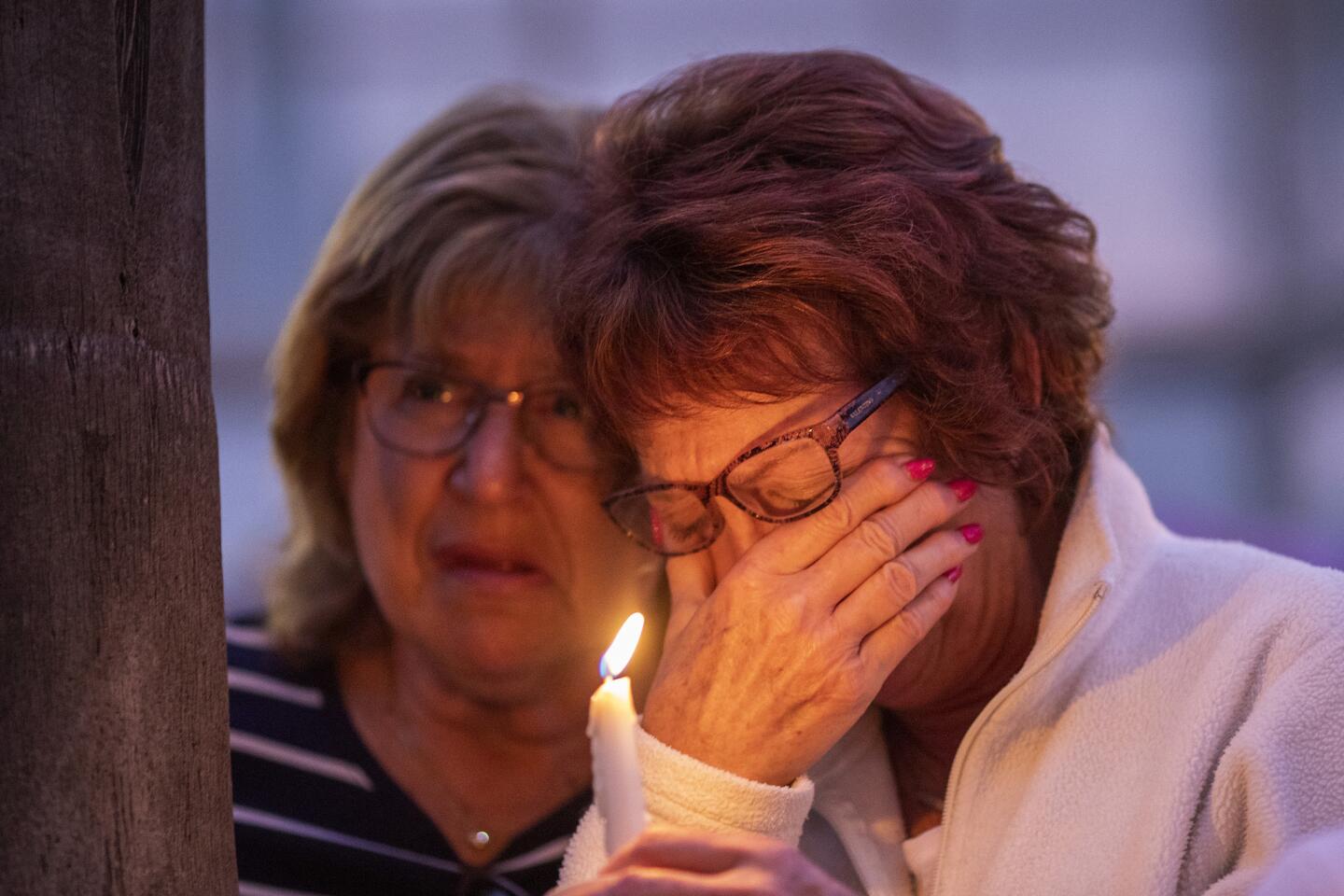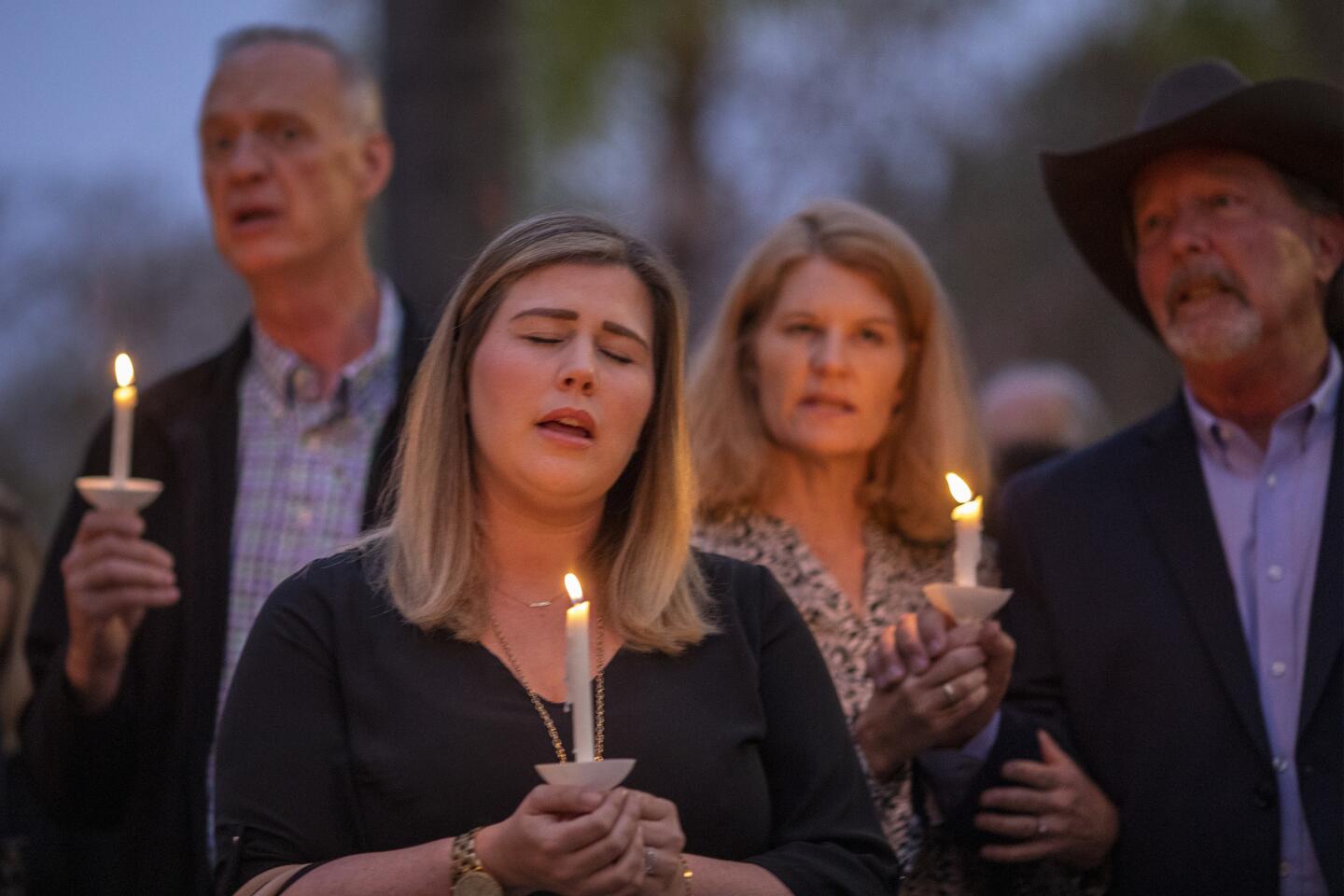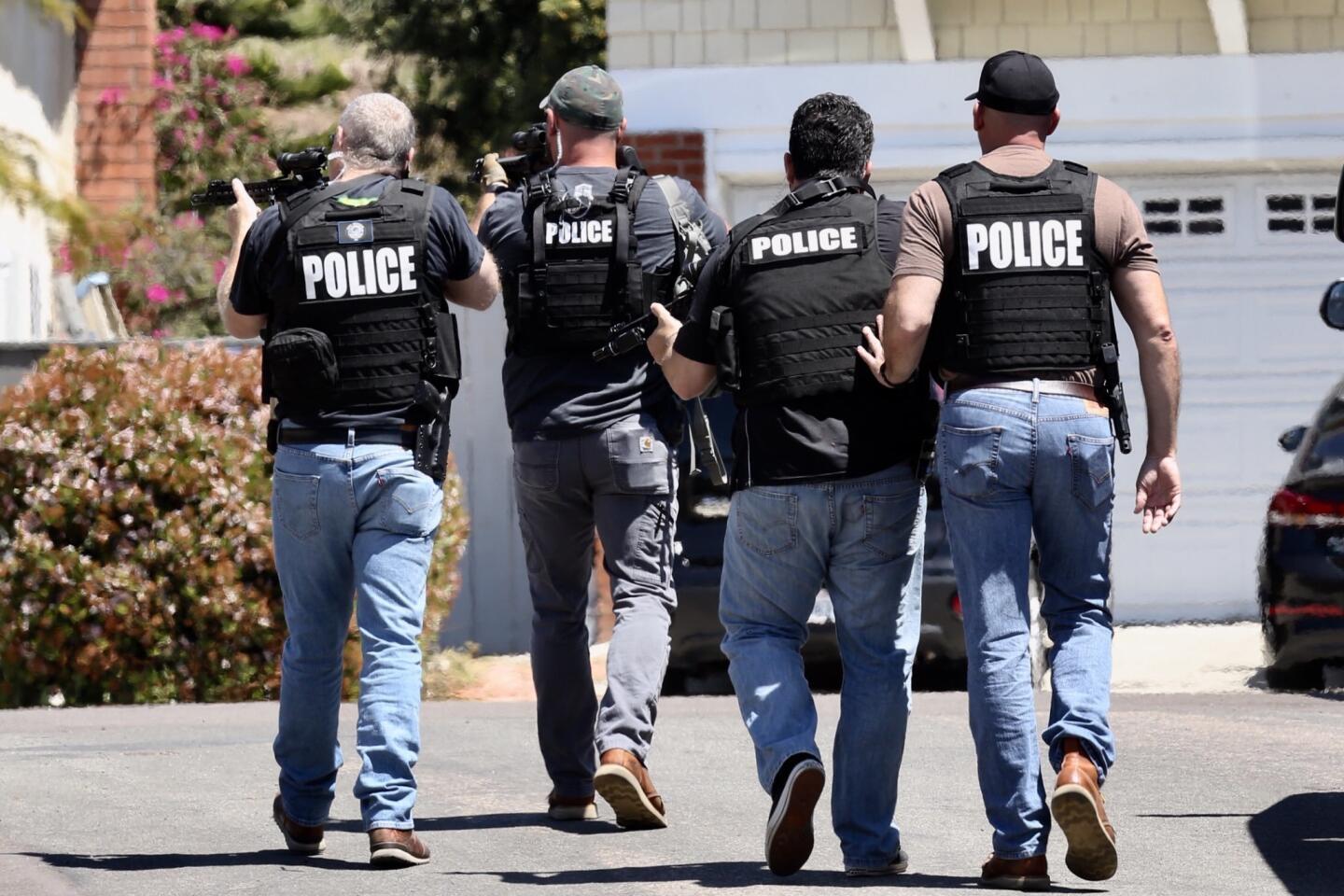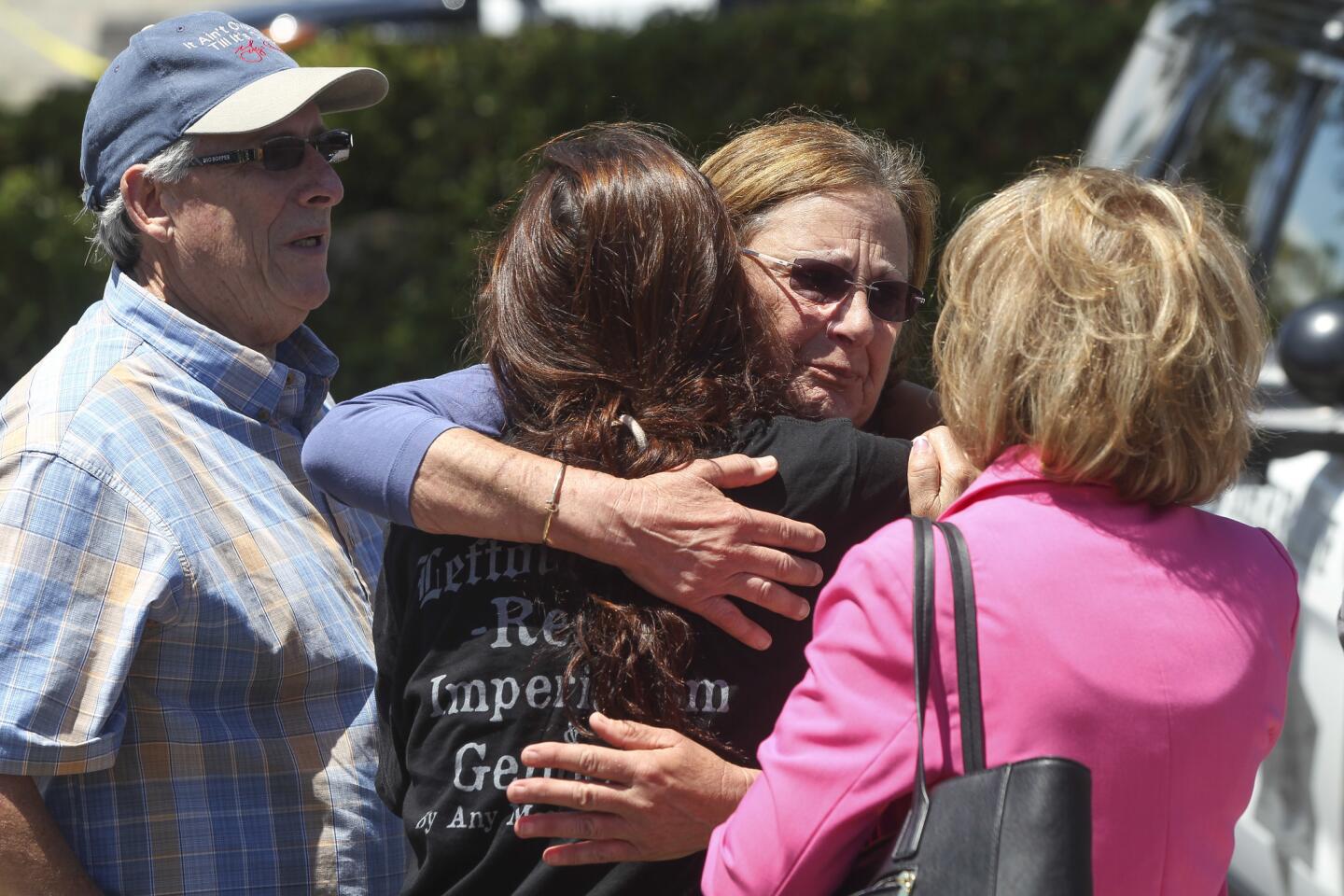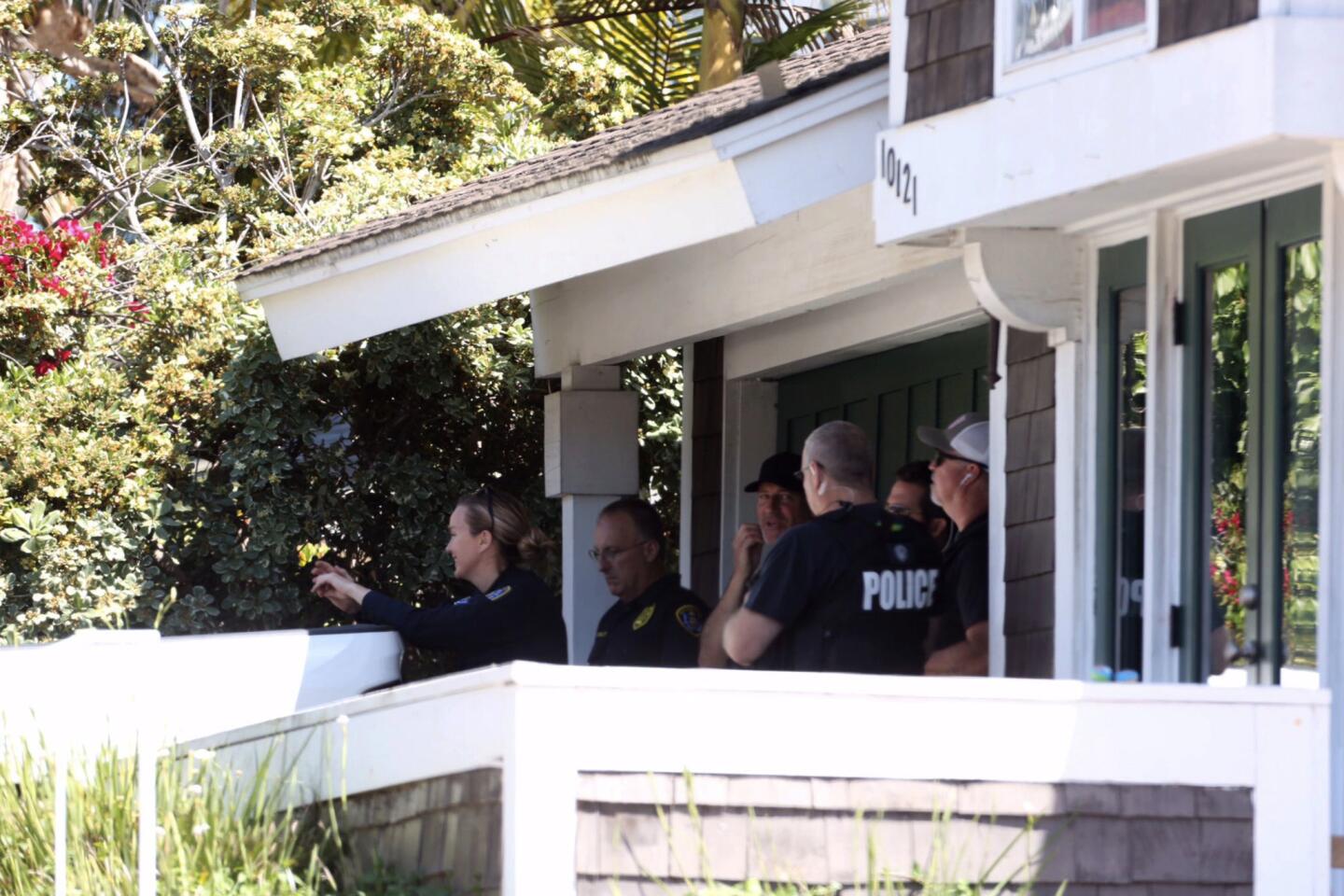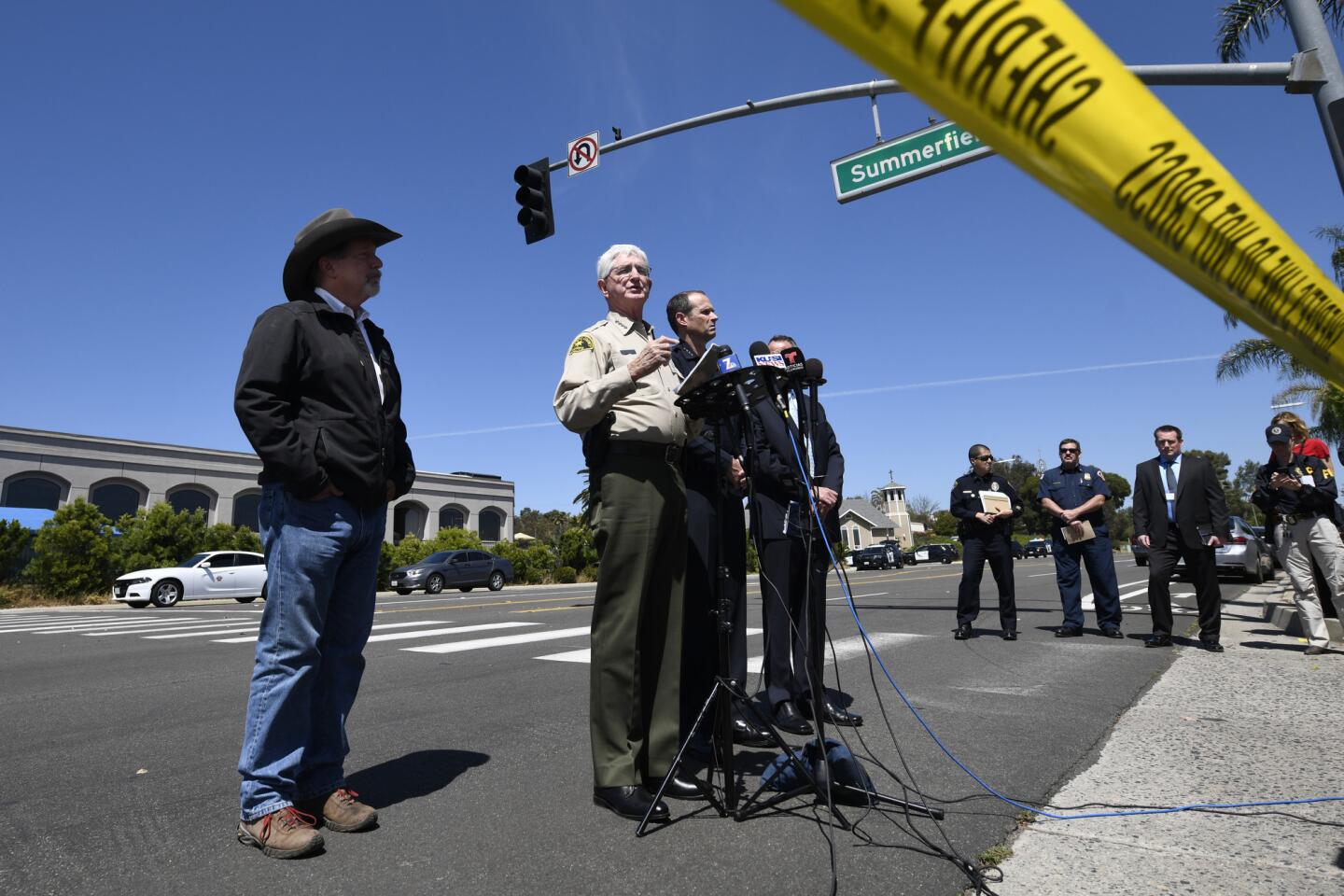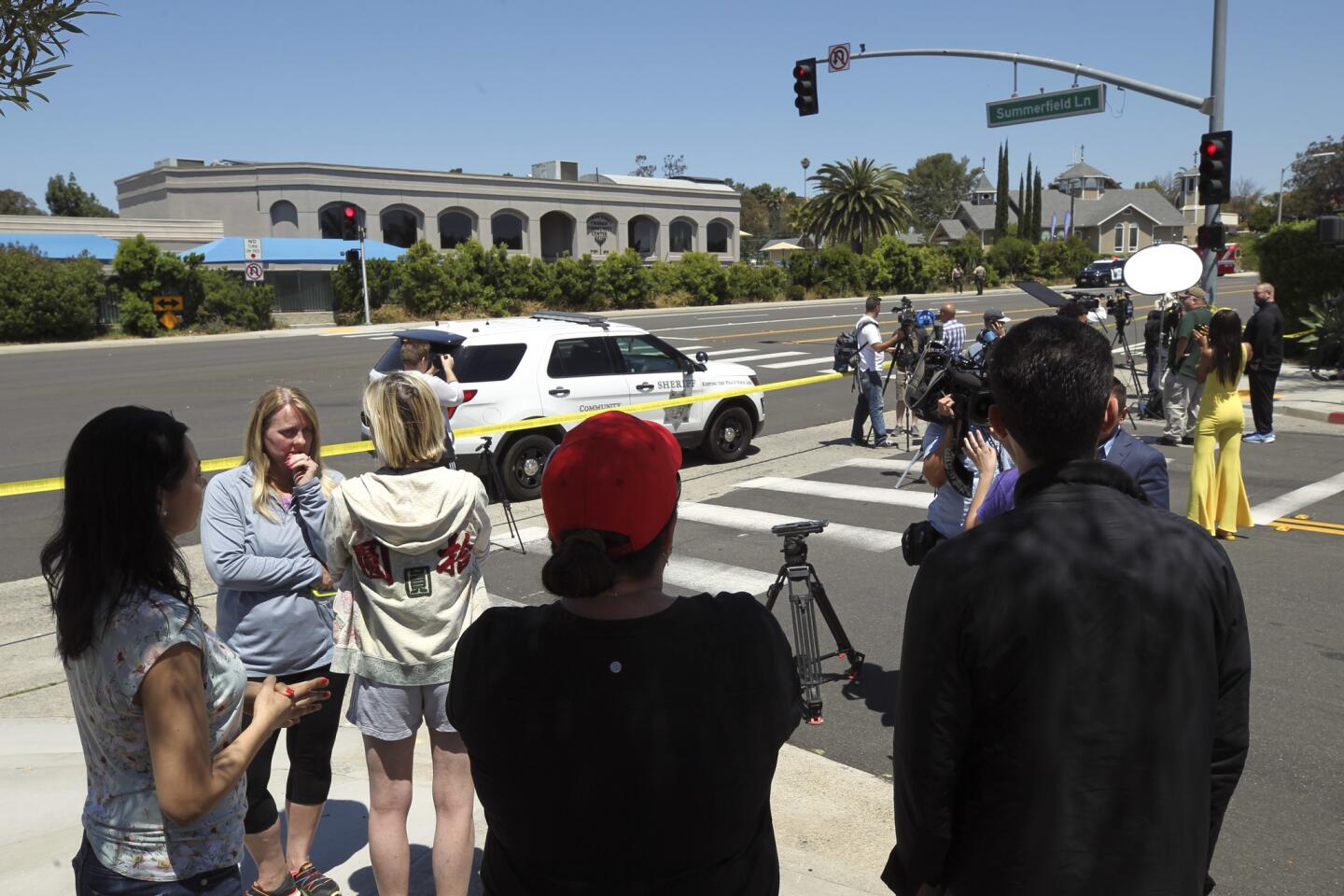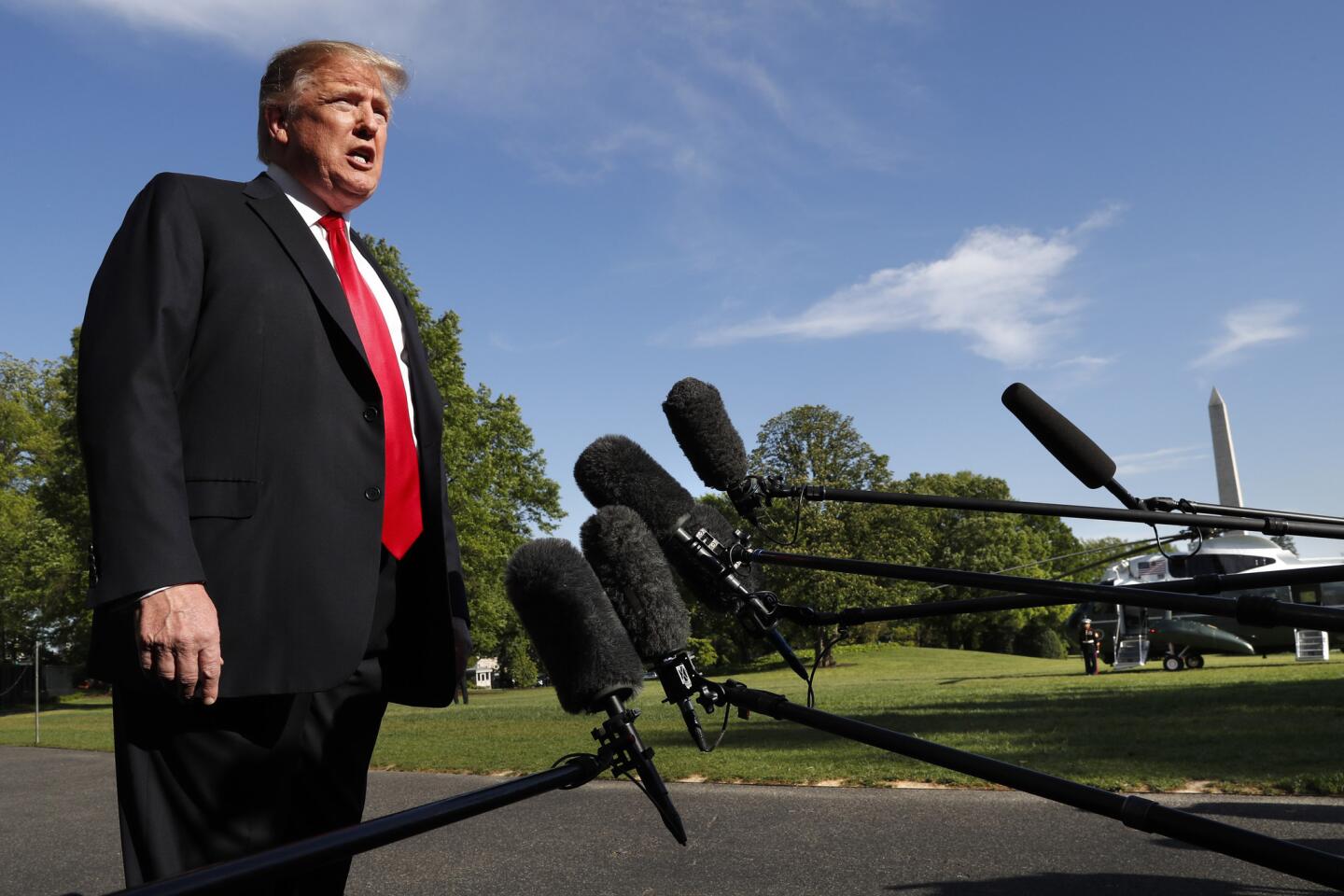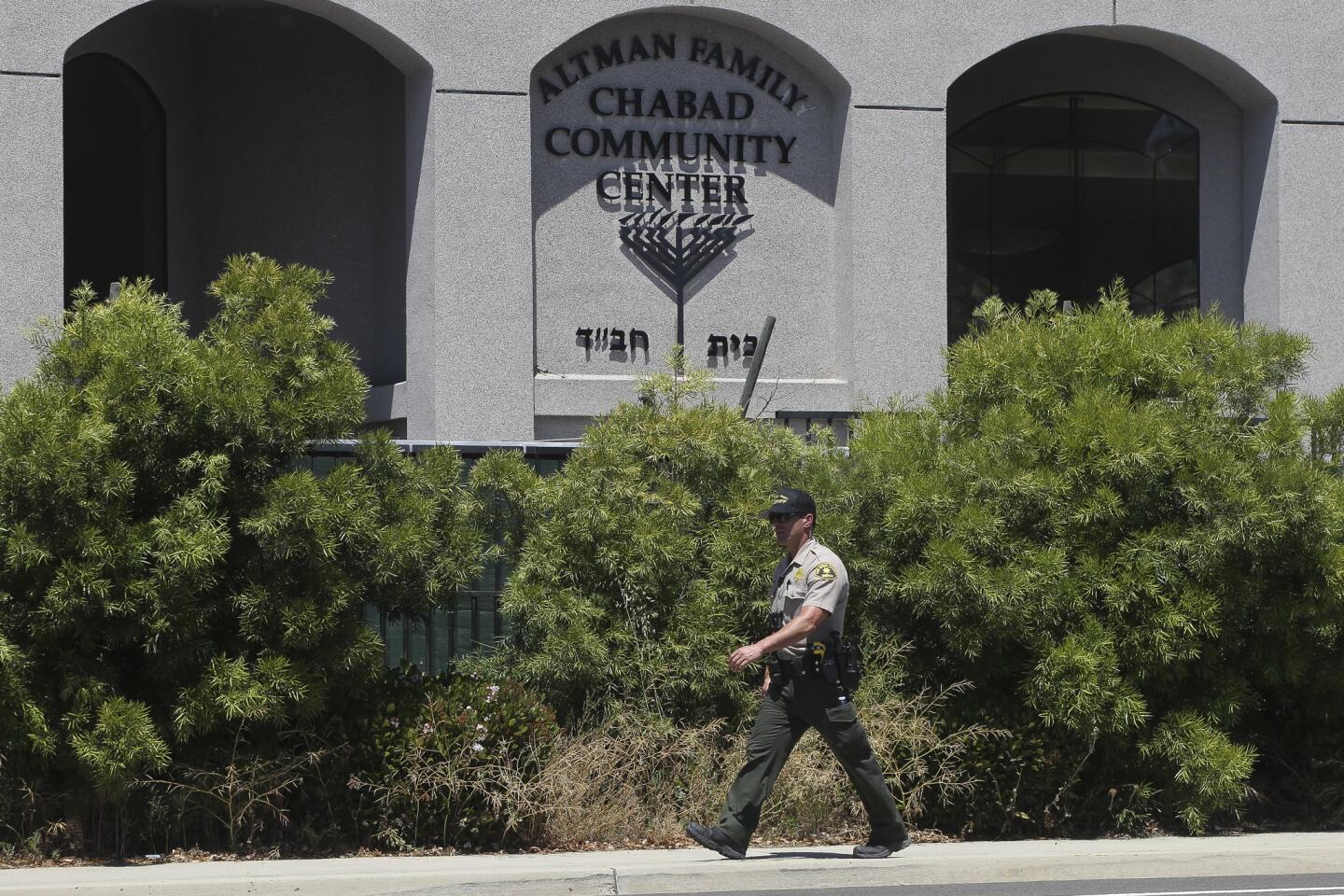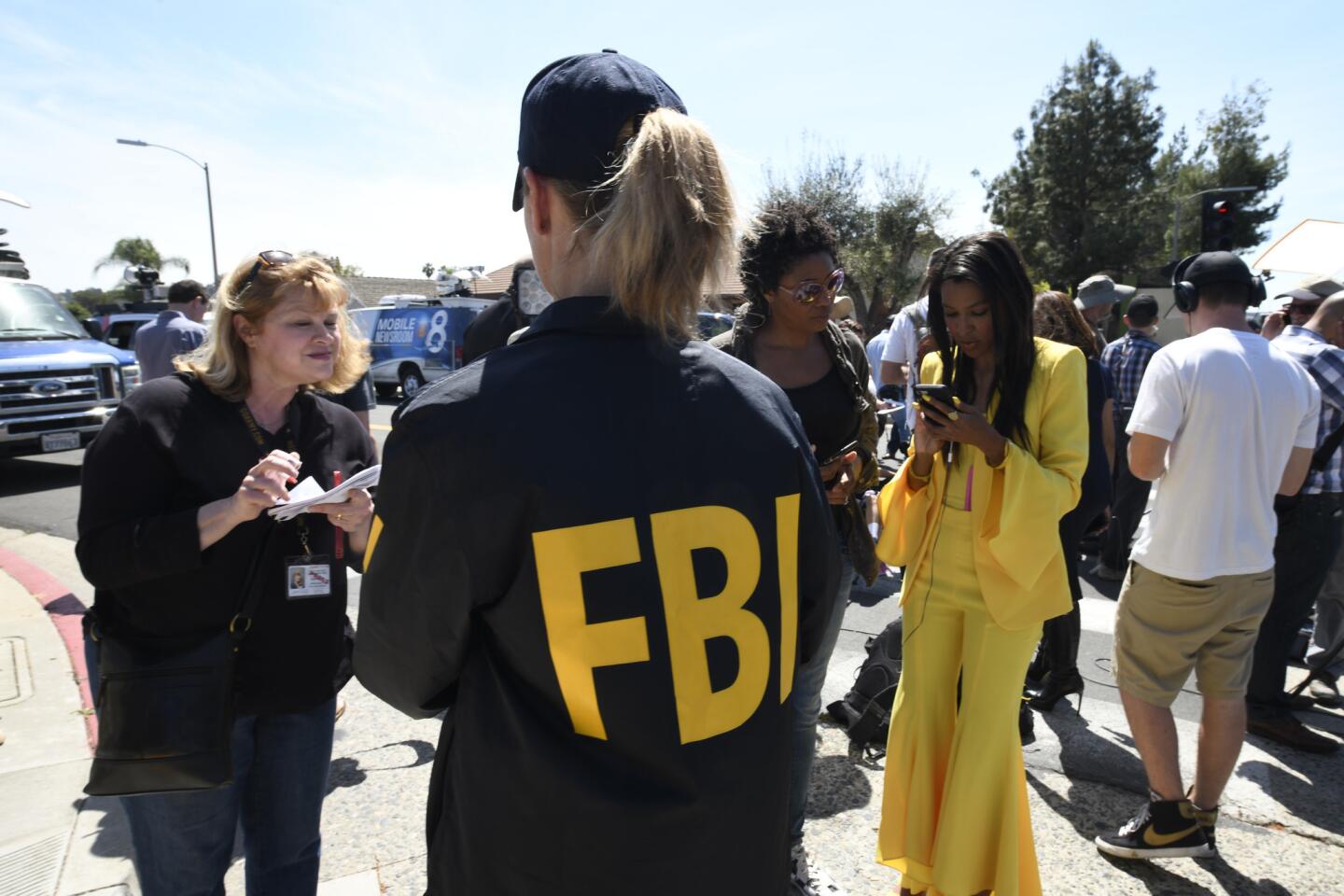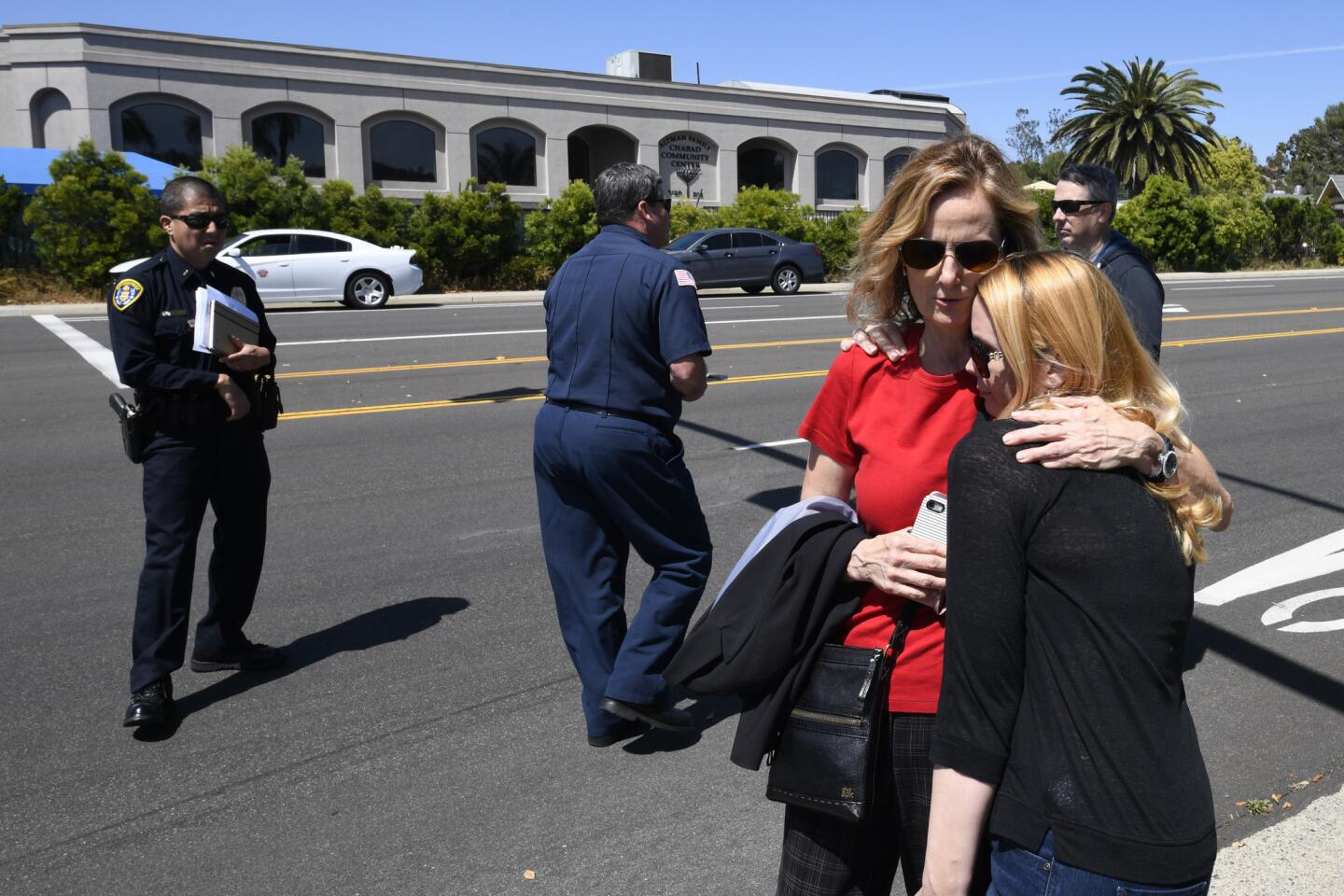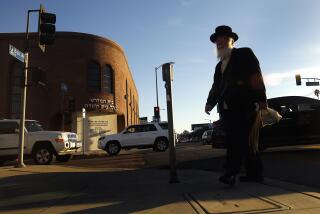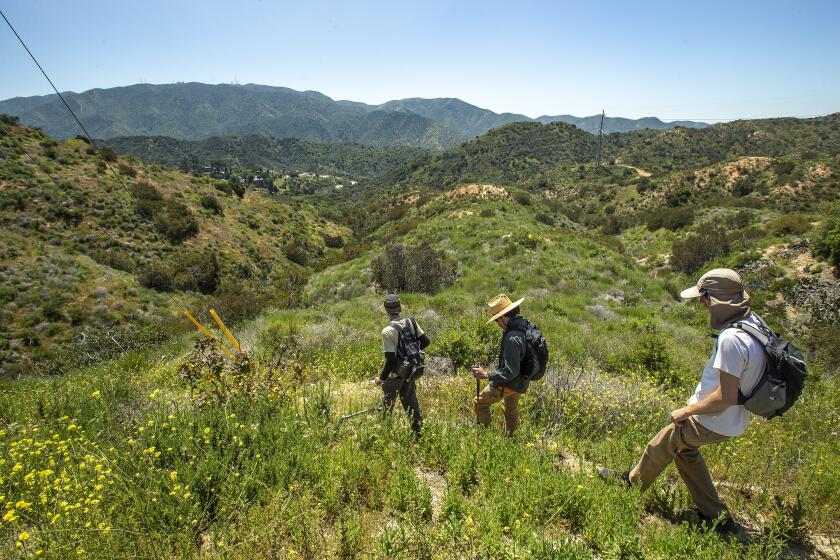Woman died jumping in front of rabbi during California synagogue shooting
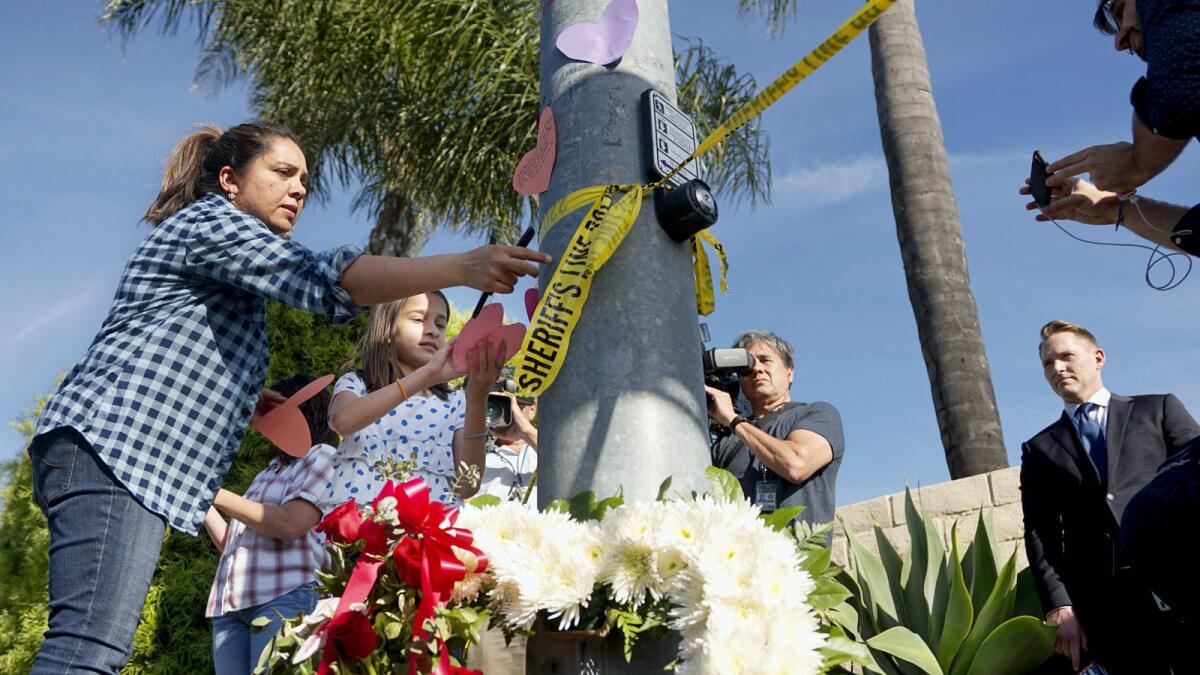
Reporting from Poway, Calif. — The rabbi was celebrating the last day of Passover with his congregants at Chabad of Poway when a gunman in a green army-style vest, armed with a semiautomatic weapon, burst in and began shooting.
Voices screeched, “Hide yourself! Shooting! Shooting!” Congregants dropped to the floor. One man threw his body over his 2½-year-old grandson; another was wounded ushering children to safety.
A 60-year-old woman was killed when she jumped in front of the rabbi, whose hands were pierced by gunfire. An 8-year-old girl was hit with shrapnel in the face and leg.
The attack was described by some of the 100 worshipers who were inside the synagogue celebrating one of the most sacred holidays in Judaism. As police across the state boosted patrols around synagogues, the small city of Poway’s tightknit Jewish community was reeling.
“Why? The question is, why?” said Minoo Anvari, whose husband was inside the synagogue during the attack. “People are praying.”
RELATED: Poway synagogue shooting suspect linked to anti-Semitic internet manifesto »
Authorities arrested the suspected shooter, John T. Earnest, who they believe was motivated by hate and, a month ago, may have tried to burn down an Escondido mosque. Investigators were checking the authenticity of an anti-Semitic screed the 19-year-old Rancho Peñasquitos resident allegedly posted online before the 11:20 a.m. shooting.
Earnest, who is white, reportedly wrote in the letter that he was willing to sacrifice his future “for the sake of my people.” He also talked about planning the attack, noting that he drew inspiration from gunmen who killed scores of people at a Pittsburgh synagogue and two New Zealand mosques.
“How long did it take you to plan the attack? Four weeks. Four weeks ago, I decided I was doing this. Four weeks later, I did it,” he wrote, describing himself as a nursing student who plays the piano.
The violence came exactly six months after a gunman killed 11 people and wounded seven others during Saturday morning Shabbat services at the Tree of Life synagogue in Pittsburgh and underscores concerns about rising incidents of anti-Jewish hate.
Anti-Semitic incidents around the nation have been increasing since 2013, with the biggest all-time annual jump coming in 2017, when the tally climbed 57% to 1,986, according to the Anti-Defamation League.
The majority of those incidents were harassment, which rose 41% to 1,015 incidents, including 163 bomb threats against Jewish community centers and synagogues. Vandalism rose 86% to 952 cases. The number of physical assaults fell from 36 to 19.
President Trump offered condolences to the Poway victims and their families from the White House lawn Saturday.
“My deepest sympathies go to the people that were affected,” he told reporters. “At this moment, it looks like a hate crime.”
Founded in 1984 by Rabbi Yisroel Goldstein, Chabad of Poway is affiliated with Lubavitch, a branch within Orthodox Judaism’s Hasidic movement. It bills itself as a place where “traditional Jewish values are brought to life in a joyous, non-judgmental atmosphere.”
It grew quickly, attracting families to a congregation modeled on the bustling Jewish enclaves that existed in New York City and Eastern Europe. Dozens moved within walking distance so they could follow the requirement not to operate machinery on the Sabbath. The campus underwent a $1.7-million expansion project in the mid-1990s, building a 13,000-square-foot facility with a sanctuary, a meeting hall and offices.
RELATED: Rabbi gives sermon of strength after being shot at Poway synagogue »
Like many synagogues around the country, Chabad of Poway responded to earlier mass shootings by increasing its security through grants from the federal Department of Homeland Security — $81,000 in 2006 and $75,000 in 2010.
“One message from all of us in our congregation is that we are standing together. We are getting stronger,” said Anvari, the synagogue member. “Never again. You can’t break us. We are strong.”
As faith leaders, civil-rights activists and politicians across the globe condemned the shooting, those inside told their stories of heroism and survival.
Danny Almog had just arrived at the synagogue with his family when he heard six loud shots — noise he thought might be a chandelier falling or chairs crashing.
He saw the gunman carrying what looked like an M-16.
“He didn’t say nothing,” said Almog, 40. “Just came in and started shooting.”
Almog said he dropped to the floor and started crawling to find his kids. He saw that his father-in-law had thrown his body over Almog’s 2½-year-old son to protect him. He saw the older man get up, and Almog ran to grab his 4-year-old daughter, Yuli, who had been in a children’s playroom with about a dozen other kids.
He screamed, “Yuli! Yuli! Where are you?”
A friend, Almog Peretz, 34, said he had her. The friend had scooped up several kids and ushered them to safety. As he did so, Peretz was struck in the leg by bullet shrapnel.
Several neighbors reported hearing the gunshots, with some briefly evacuated from their homes.
Authorities said the suspect’s gun may have jammed during the shooting. As Earnest fled, an off-duty Border Patrol agent who was working as a security guard at the synagogue fired several shots, hitting the suspect’s car. The suspect called 911 shortly after and told a California Highway Patrol dispatcher that he was involved in the shooting.
Around the same time, a San Diego police K-9 officer was racing to the scene after hearing about the shooting on the police radio. The officer was monitoring the CHP radio as well and stopped where the suspect had pulled over, at Rancho Bernardo Road and Interstate 15.
“He jumped out of the car with his hands up,” San Diego police Chief David Nisleit said, and was taken into custody without incident.
A rifle was found on the passenger seat. Sheriff Bill Gore said an “AR-15-type assault weapon” was used in the shooting.
Friends identified the woman killed as Lori Kaye, 60, of Poway. Some gathered at her home to grieve Saturday afternoon, as stories emerged about her heroic act inside the synagogue.
Roneet Lev, a member of the congregation, related an account from Rabbi Goldstein of how Kaye threw herself in front of him, possibly saving his life.
Kaye’s husband, a physician, was in the synagogue when the gunshots started. Worshipers called him over to help victims, and he began to do CPR on one until he realized it was his wife, Lev said. He then fainted.
Kaye had gone to the synagogue to say Kaddish, a Jewish prayer for the dead, for her mother, who had recently passed away, according to Lev.
“The irony is, people will be saying it for her now,” Lev said.
By the afternoon, police were swarming Earnest’s north San Diego neighborhood, blocking off streets and telling residents to shelter in place, as they prepared to search his home on Freeport Court.
Cantor Caitlin Bromberg of Ner Tamid Synagogue, which is down the street from Chabad of Poway, said her congregation learned of the shooting at the end of their Passover services. Bromberg said her congregants were en route to Chabad of Poway to show support and help in any way they could.
“We are horrified and upset, and we want them to know we are thinking of them,” she told The Times. “The message of the final day of Passover is to be looking forward to … the time when all the world will be at peace.”
The eight-day festival commemorates the freedom of the Israelites from slavery in ancient Egypt and is typically observed with a number of rituals, including Seder meals, the removal of leavened products from the home, and the sharing of the Exodus story.
“We’re feeling fear,” Bromberg said. “It could have just as easily been our service. It hits close to home.”
For Rabbi David Castiglione, Saturday’s shooting left a sense of “tremendous, devastating sadness and unspeakable outrage.”
“I am so completely fed up with the state of the world at this point,” said Castiglione. “I am completely mystified.”
The rabbi, who leads Temple Adat Shalom, about two miles from Chabad of Poway, said the congregation was in the middle of its own services when he was pulled aside and told what was happening.
“I haven’t been able to be put in touch with Chabad, and nobody uses their electronics until the Sabbath is over, so unfortunately we have no way of reaching them until later tonight,” he said. “We are trying to be as supportive as we can.”
The rabbi said there were only about 700 Jews in his North County area of San Diego. “This is a town where everybody knows everybody,” he said. “It is a town of love.”
When the shooting at the Tree of Life synagogue happened last October, Castiglione’s temple held a vigil, and people of all faiths attended. Some dropped flowers at his congregation in a show of support.
“It’s the six-month anniversary of the Tree of Life today, on Shabbat, and this week commemorates Holocaust memorial … it makes it that much more painful.”
Chabad, he said, is neighbored by two churches — a sign of the acceptance that normally permeates the community. As he was building his congregation, he said, the church took them in.
“It’s a town where we give,” he said.
On Saturday evening, people left bouquets of flowers on the sidewalk across the street from the synagogue. Nami Rajaei, a high school senior who lives nearby, brought a large peach-colored flower for the impromptu memorial.
Two of Rajaei’s classmates at Rancho Bernardo High School placed candles amid the flowers at the memorial. The three teenagers said their quiet suburban neighborhood, where children are taught to value diversity at school and at their houses of worship, was the last place they expected this to happen.
“I would like to think that our community is very tolerant,” Rajaei, 18, said.
Tanya Werby, a member of the Chabad of Poway congregation, said she was planning to take her 4-year-old son to the Saturday morning service but ended up staying home.
She told her son, who attends preschool at the synagogue, that Rabbi Goldstein was hurt. But the boy is too young to understand much more.
Werby, 42, said Goldstein was well known in the area because he often worked with leaders of other congregations. She said she was not surprised by reports that he did his best to defend his congregation after the shooter entered.
“I’m sure he kept his cool. He’s very strong,” Werby said. “He built this community since the 1980s. Everybody knows him. He’s a big part of this community.”
Werby described the woman who was killed as a “very generous person” who was a constant presence at the synagogue. As the owner of a print shop, the woman donated shirts for a friendship walk and gave money as well, Werby said.
Werby’s friend Jackie Zucker drove from Carlsbad to join her after hearing the news.
“People came here in the morning just wanting a lovely Saturday to finish the holiday,” said Zucker, 78. “Instead, this happened. We need to stop this.”
Later Saturday, hundreds of people filled the pews at Rancho Bernardo Community Presbyterian Church for an interfaith service and candlelight vigil.
Everyone joined hands and swayed as Lori Frank, cantor of Temple Adat Shalom in Poway, led a Hebrew prayer for peace, “Oseh Shalom.”
Outside, as daylight faded, the mourners stood in a circle holding candles, singing “We Shall Overcome.”
Tiara Miller, 19, who is Muslim and a member of the Islamic Center of San Diego, came to the vigil with her parents and two younger brothers.
She said the bloodshed at the synagogue “felt like a personal attack on me — like attacking my sibling.”
“We know what it feels like to be attacked because of the beliefs we have,” she said. “All of us are brothers and sisters of faith, even those who don’t believe in God. We should all stand together.”
Davis and Jones write for the San Diego Union-Tribune. Times staff writers Melissa Etehad, Angel Jennings and Jaweed Kaleem, and Union-Tribune staff writers John Wilkens, Pauline Repard, Teri Figueroa and Wendy Fry contributed to this report.
More to Read
Sign up for Essential California
The most important California stories and recommendations in your inbox every morning.
You may occasionally receive promotional content from the Los Angeles Times.

